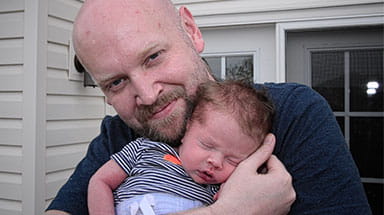James Trimbee — Melanoma Patient Story

James Trimbee’s melanoma journey didn’t start with a suspicious mole or lesion. It began with a lump under his right armpit “about the size of half a tennis ball” and what he thought was unrelated blurred vision in his right eye.
It took time to diagnose and find the right combination of treatments. But thanks to a cautious and persistent team of doctors at UPMC and UPMC Hillman Cancer Center, he got the care he needed to successfully treat the deadliest form of skin cancer.
“I was diagnosed, I was treated, and I survived. That’s about the best possible outcome for a cancer diagnosis — especially one that kills so many people,” says James.
Identifying a fluid-filled mass
The Monroeville resident, then 45, initially sought treatment for the lump at the UPMC East Emergency Department (ED) in January 2019. Imaging showed a fluid-filled mass that appeared to be benign. Doctors recommended he see a surgeon to determine the best course of action.
He made an appointment with Khalid Shalaby, MD, a UPMC East general surgeon and surgical oncologist. Fearing it might be lymphoma, Dr. Shalaby ordered a biopsy. The results were inconclusive, but abnormal cells were detected. So, he referred James to UPMC Hillman Cancer Center.
After what seemed like “an endless battery of tests,” a PET scan detected cancer cells in his arm. “It lit up like a Christmas tree,” says James.
Surgery was scheduled, but James wound up in the UPMC East ED again when the mass suddenly hardened and became painful. Dr. Shalaby, who was on call that night, performed emergency surgery to remove the mass. But a small amount entangled in the vascular structures in his arm had to be left behind for a future surgery.
Targeted treatment
James' mass was biopsed and sent to top soft tissue specialists in the country to identify, including Yana Najjar, MD, a medical oncologist at UPMC Hillman who specializes in melanoma. James had stage IV metastatic melanoma.
A decade ago, there were few options for treating metastatic melanoma. But immunotherapy — which trains a person’s immune system to target and kill melanoma cells — has dramatically increased treatment options and survival rates.
“As soon as we identified what it was genetically, the care team knew what they had to do,” says James. “It was very scary. But they assured me it was treatable.”
In May 2019, James began a one-year course of immunotherapy treatments at UPMC Hillman in Monroeville — just minutes from his home. “The convenient location was absolutely crucial. When you have a battery of appointments, tests, and treatments, having a facility of UPMC Hillman’s caliber nearby is important,” he says.
Additional surgery
Dr. Najjar agreed that the remaining tumor and lymph nodes needed to be removed.
“I was very reluctant to have more surgery. I was worried about the risk of nerve damage in my right arm,” says James. “But Dr. Najjar was very convincing. She made it clear that it was the right thing to do in my case.”
In September 2019, James underwent surgery at UPMC Shadyside. “It went off without a hitch,” he says. “I have full use of my arm.”
PET scans taken every 3 months since his immunotherapy and surgery show no signs of cancer. “Almost immediately, there was nothing there. Between the surgery and the immunotherapy, they really clobbered it. It was gone,” says James.
Worrisome eye symptoms
While seeking treatment for the lump under his arm, James also became increasingly worried about a “softening” or blurring of vision in his right eye. He had been treated for a detached retina in his other eye the previous year and wondered if it happened again.
He ended up scheduling an appointment with Marie-Helene Errera, MD, PhD, an ophthalmologist at the UPMC Eye & Ear Institute and one of the world’s leading experts in retinal diseases. Seeing the inflammation in his retina, she eventually diagnosed him with melanoma-associated retinopathy (MAR) — a rare autoimmune condition that occurs when the body’s immune system responds to the melanoma by mistakenly attacking the cells of the retina.
Dr. Errera treated both eyes with steroids. His vision has since stabilized, and he continues to undergo regular monitoring of his eyes.
Disease-free and thankful
A year after the immunotherapy treatments ended, James remains cancer-free. The father of two, who continued to work throughout his diagnoses and treatments, says life is back to normal.
“I feel good and there’s no sign of disease,” says James. He gives credit to his entire team of doctors at UPMC and UPMC Hillman.
“I saw so many specialists. If my care hadn’t been so well coordinated, it would have been much more difficult,” James said. “I look forward to being around for my kids and staying healthy. And I couldn’t have done it without UPMC.”
James' treatment and results may not be representative of similar cases.

